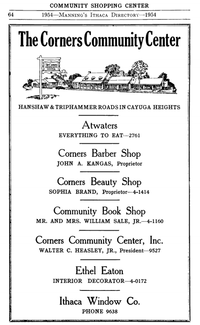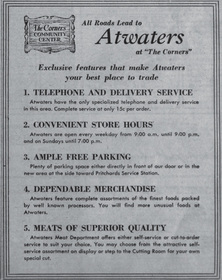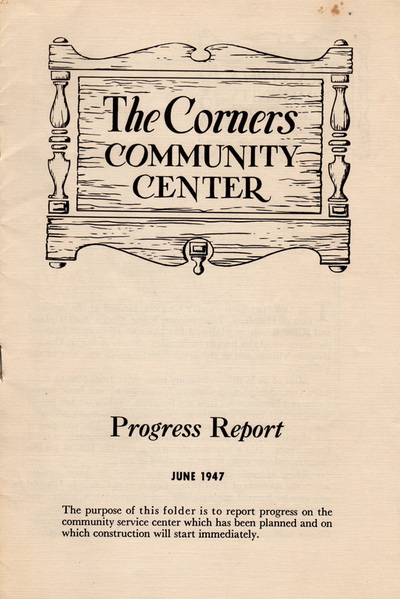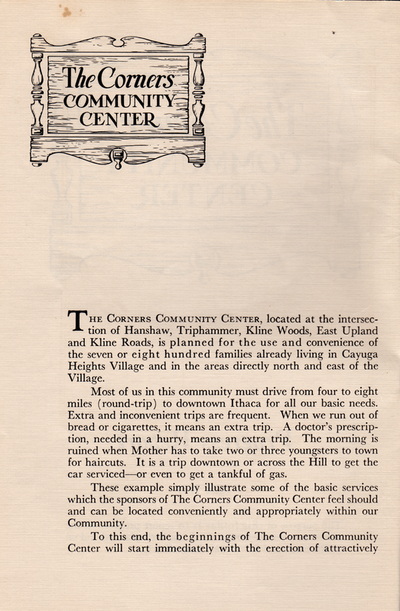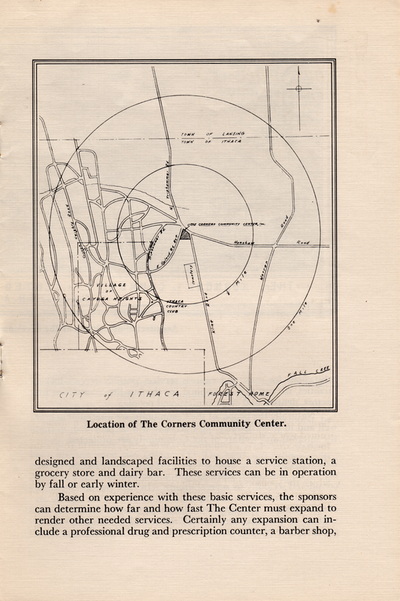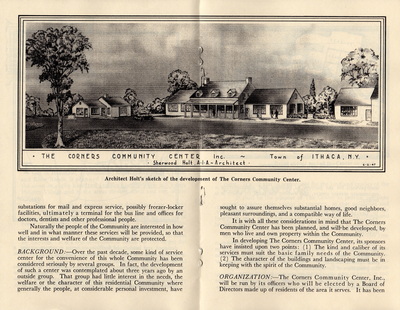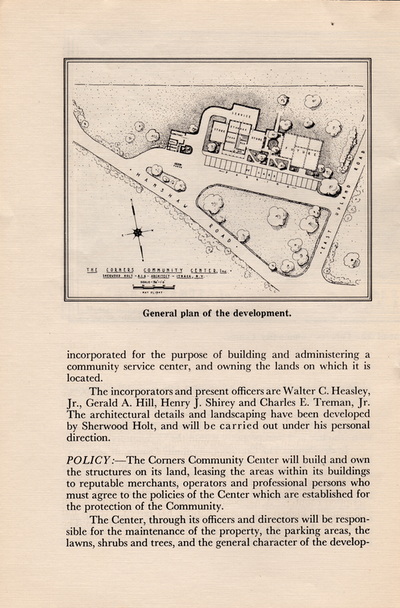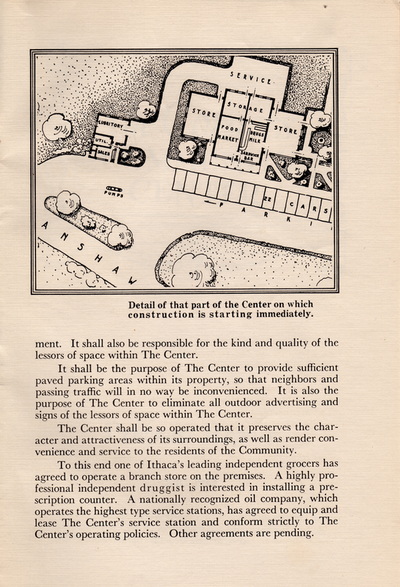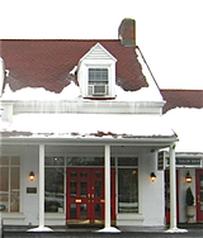
Corners Community Center (Community Corners)
903 Hanshaw Road
Year Built: 1948
Architect: Sherwood Holt
Built in the late-1940s, the original Corners Community Center, a small but distinctive, colonnaded white building with a red gable roof reminiscent of a Colonial era tavern, is a Village landmark. Designed to serve the daily retail needs of Cayuga Heights residents, it continues to anchor the village's commercial district.
Incorporated in 1946 by Walter C. Heasley Jr., Gerald A. Hill, Henry J. Shirey, and Charles E. Treman Jr., it was an outgrowth of developers Jared T. Newman and Charles Blood's original planning for small shops that would be within walking distance of villager's homes. In the 1930s, Jared Newman described his vision of a commercial center that would offer convenient services to village residents but not "mar the beauty and quietness of the locality."
903 Hanshaw Road
Year Built: 1948
Architect: Sherwood Holt
Built in the late-1940s, the original Corners Community Center, a small but distinctive, colonnaded white building with a red gable roof reminiscent of a Colonial era tavern, is a Village landmark. Designed to serve the daily retail needs of Cayuga Heights residents, it continues to anchor the village's commercial district.
Incorporated in 1946 by Walter C. Heasley Jr., Gerald A. Hill, Henry J. Shirey, and Charles E. Treman Jr., it was an outgrowth of developers Jared T. Newman and Charles Blood's original planning for small shops that would be within walking distance of villager's homes. In the 1930s, Jared Newman described his vision of a commercial center that would offer convenient services to village residents but not "mar the beauty and quietness of the locality."
"I am aiming to make in this development something of a community center in itself. . . . In connection with this [gasoline supply] station there might be a store . . . , and it is possible that a repair shop could be located and made unobjectionable, where one could go for all sorts of needed repairs, not only to automobiles but to such needs as arise so frequently in carrying on household operations and other wise." Jared T. Newman, "Explanatory Notes," Jared Treman Newman Papers, 1803-1953, Collection Number 2157, Division of Rare and Manuscript Collections, Cornell University Library.
|
The first tenants at The Corners were Atwaters Grocery Store, Hill Drug Store, and a Sinclair Service Station. In the 1950s, John Kangas owned the Corners Barber Shop (which still welcomes customers today), and Sophia Brand was the proprietor of the Corners Beauty Shop.
For Lucy Hirshfeld, who grew up on West Upland Road, shopping at the Corners in the mid-1950s was a well-earned treat. She saved her 25-cent weekly allowance and money from babysitting and yardwork. After she had accumulated enough quarters, she and a group of friends would walk to Community Corners, sometimes stopping at Mrs. Nungezer's house at 202 East Upland Road. (Mrs. Nungezer was a much-loved teacher at Cayuga Heights Elementary School.) At the Community Book Shop, Lucy would carefully look over the selection of china horses and buy one for $1.25 to add to her collection. She and her friends stopped at Hill Drug Store and enjoyed a cherry phosphate soda, a blissfully sweet bargain at 10 cents. |
Writer Kirkpatrick Sale, who grew up in the Village at 309 The Parkway and whose parents owned the Community Book Shop, worked as a summer cashier at Atwaters grocery store at "The Corners." Sale remembers the shopping center as the social hub of Cayuga Heights:
"Not only was the community small but it had something it called the Community Corners as its economic hub, and that was no more than a grocery store, dry cleaners, bookstore, and maybe a small variety store. I worked in the grocery in the summers for three years, and my impression is that the Corners functioned less as an economic hub–-it couldn’t have been doing that much business, and larger, fancier stores were available a few miles away in downtown Ithaca–than a social one. People would gather and talk in knots, in the parking lots, on the sidewalk, at the meat counter in the back, and so many people used to come through the checkout line at my cash register on Sundays with only one or two items that I used to wonder whether they had come out of necessity or just to see other people after church." Kirkpatrick Sale, "The Importance of Growing Up Village," Front Porch Republic, May 29, 2009. |
It is also said that Vladimir Nabokov spent time at Corners Community Center and even mentions it in his comic novel Pale Fire (1962). (Incidentally, Nabokov probably holds the record for having taken up residence in the most houses in the Village--six: 623 Highland Road, 106 Hampton Road, 808 Hanshaw Road, 425 Hanshaw Road, 880 Highland Road, and 404 Highland Road. Cornell Romance Literature professor Morris Bishop and his wife, artist Alison Mason Kingsbury, of 903 Wyckoff Road, helped bring Nabokov to Ithaca. In one letter penned to his friend, Nabokov encouraged Bishop to "give Lolita a try," claiming it to be his "best work so far.") In Pale Fire, the narrator and a celebrated poet leave their faculty office to pick up their versions of sustenance before they head home:
"I wanted to know if he did not mind being taken the longer way, with a stop at Community Center where I wanted to buy some chocolate-covered cookies and a little caviar. He said it was fine with him. From the inside of the supermarket, through a plate-glass window, I saw the old chap pop into a liquor store. When I returned with my purchases, he was back in the car, reading a tabloid newspaper which I had thought no poet would deign to touch. A comfortable burp told me he had a flask of brandy concealed about his warmly coated person." Vladimir Nabokov, Pale Fire, Putnam Publishing Group, 1962.
Although current residents can't enjoy the long-departed Atwaters grocery store or Hill Drug Store, the Corners is still host to the Corner Barber Shop, as well as businesses representative of today's tastes, including the Heights Restaurant, JJ's Cafe, Flower Fashions by Haring, and Island Health and Fitness gym.
As the enduring commercial and social hub of Cayuga Heights, its future is important and as such has received attention in the Village's first comprehensive plan.
As the enduring commercial and social hub of Cayuga Heights, its future is important and as such has received attention in the Village's first comprehensive plan.
Click on the images below to read the 1947 plan for the Corners Community Center.
